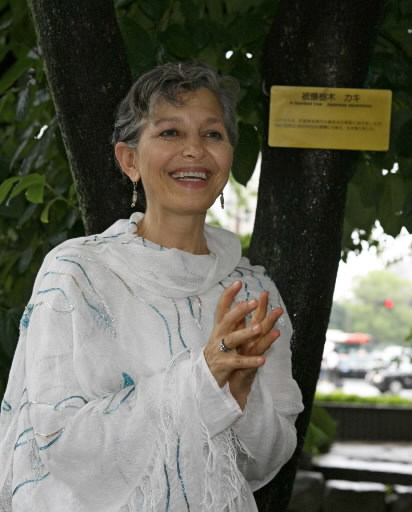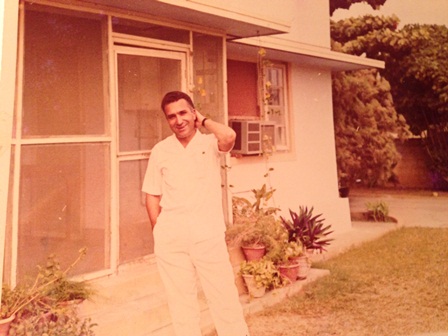My mentor: Nassrine Azimi, senior advisor to the United Nations Institute for Training and Research
Jul. 12, 2013
Nurtured by father’s unbiased, broad mind
The person who has had the greatest impact on my life is my father, Hossein P. Azimi. The older I get, the more I realize what a great man he was. (Mr. Azimi died in 2001 at the age of 77.)
My father’s influence played a big part in my taking an international job with the United Nations Institute for Training and Research (UNITAR) and also in my taking the initiative in founding "Green Legacy Hiroshima,”
a citizens’ group that sends seeds and seedlings from trees that survived the atomic bombing around the world.
I was born in Iran but also lived in Pakistan and Turkey because of my father’s work. The turning point in my life was when I left for studies to Switzerland at the age of 17. I was able to do that because my father wanted me to live and study abroad and broaden my perspective.
My father was born in Ardabil in northwestern Iran. It’s a verdant city not far from the Caspian Sea. His father died when he was 11, and after graduating from high school he underwent a training course in forest management and went to work on a government project for forests. His dream was to become a surgeon, but instead he got a scholarship to a military academy and became a career officer, the only path open to men who were poor but capable.
Perhaps because he had a hard time after losing his father at a young age, he understood other people’s feelings. He was a hard worker and hated unfairness. He may have learned to be so broad-minded and unbiased from all the Persian poetry he was fond of.
I was born into an Islamic family, but from the ages of 10 to 16 I went to the Jewish school in Tehran. My classmates were not only Jews but also Muslims, Zoroastrians and Christians. My father felt that religion, race and gender did not pose barriers to interaction between people. I guess I naturally picked up this belief from him.
My parents left for the United States about five years after the Iranian Revolution.
While I was working at the New York office of UNITAR, I decided to take the job of opening a UNITAR office in Hiroshima. I was excited about it, but I was also concerned about quitting my job in New York and leaving the U.S., where my parents lived.
At that time, my father, who was living in California, sent me a long fax filled with Persian poetry. “Don’t worry. Have a broad vision and go ahead with your plans,” he wrote in essence. I was very encouraged.
About a year later my father died due to illness. It’s really too sad he had no opportunity to visit Hiroshima. I’m sure he would have supported the efforts to eliminate nuclear weapons.
My father had respect for nature, culture and people. If more people were like him, there would be no more hatred or wars.
I have a picture of my father on display in my home. After leaving my job as director of UNITAR’s Hiroshima office, I stayed on to continue my efforts toward peace. I think my father would have been proud of this, and I believe he is always watching over me.
(This interview was conducted by Sakiko Masuda, Staff Writer.)
Nassrine Azimi
Born in Iran in 1959. Moved for her studies to Switzerland at the age of 17. Earned a master’s degree in international affairs from the Graduate Institute in Geneva in 1986 and another master’s degree from Geneva University’s Institute of Architecture in 1998. Joined the United Nations Institute for Training and Research (UNITAR) and became a full staff in 1988. After serving as chief of UNITAR’s New York office, became the first director of its new Hiroshima office in 2003. Stepped down in 2009. Since 2011 has been involved in a project to send seeds and seedlings from trees that survived the atomic bombing around the world. Writes opinion pieces in the New York Times and other publications on various issues, including Hiroshima’s efforts to bring about peace and on the aftermath of the accident at the nuclear power plant in Fukushima. Resident of Hiroshima.
(Originally published on July 1, 2013)
The person who has had the greatest impact on my life is my father, Hossein P. Azimi. The older I get, the more I realize what a great man he was. (Mr. Azimi died in 2001 at the age of 77.)
My father’s influence played a big part in my taking an international job with the United Nations Institute for Training and Research (UNITAR) and also in my taking the initiative in founding "Green Legacy Hiroshima,”
a citizens’ group that sends seeds and seedlings from trees that survived the atomic bombing around the world.
I was born in Iran but also lived in Pakistan and Turkey because of my father’s work. The turning point in my life was when I left for studies to Switzerland at the age of 17. I was able to do that because my father wanted me to live and study abroad and broaden my perspective.
My father was born in Ardabil in northwestern Iran. It’s a verdant city not far from the Caspian Sea. His father died when he was 11, and after graduating from high school he underwent a training course in forest management and went to work on a government project for forests. His dream was to become a surgeon, but instead he got a scholarship to a military academy and became a career officer, the only path open to men who were poor but capable.
Perhaps because he had a hard time after losing his father at a young age, he understood other people’s feelings. He was a hard worker and hated unfairness. He may have learned to be so broad-minded and unbiased from all the Persian poetry he was fond of.
I was born into an Islamic family, but from the ages of 10 to 16 I went to the Jewish school in Tehran. My classmates were not only Jews but also Muslims, Zoroastrians and Christians. My father felt that religion, race and gender did not pose barriers to interaction between people. I guess I naturally picked up this belief from him.
My parents left for the United States about five years after the Iranian Revolution.
While I was working at the New York office of UNITAR, I decided to take the job of opening a UNITAR office in Hiroshima. I was excited about it, but I was also concerned about quitting my job in New York and leaving the U.S., where my parents lived.
At that time, my father, who was living in California, sent me a long fax filled with Persian poetry. “Don’t worry. Have a broad vision and go ahead with your plans,” he wrote in essence. I was very encouraged.
About a year later my father died due to illness. It’s really too sad he had no opportunity to visit Hiroshima. I’m sure he would have supported the efforts to eliminate nuclear weapons.
My father had respect for nature, culture and people. If more people were like him, there would be no more hatred or wars.
I have a picture of my father on display in my home. After leaving my job as director of UNITAR’s Hiroshima office, I stayed on to continue my efforts toward peace. I think my father would have been proud of this, and I believe he is always watching over me.
(This interview was conducted by Sakiko Masuda, Staff Writer.)
Nassrine Azimi
Born in Iran in 1959. Moved for her studies to Switzerland at the age of 17. Earned a master’s degree in international affairs from the Graduate Institute in Geneva in 1986 and another master’s degree from Geneva University’s Institute of Architecture in 1998. Joined the United Nations Institute for Training and Research (UNITAR) and became a full staff in 1988. After serving as chief of UNITAR’s New York office, became the first director of its new Hiroshima office in 2003. Stepped down in 2009. Since 2011 has been involved in a project to send seeds and seedlings from trees that survived the atomic bombing around the world. Writes opinion pieces in the New York Times and other publications on various issues, including Hiroshima’s efforts to bring about peace and on the aftermath of the accident at the nuclear power plant in Fukushima. Resident of Hiroshima.
(Originally published on July 1, 2013)









